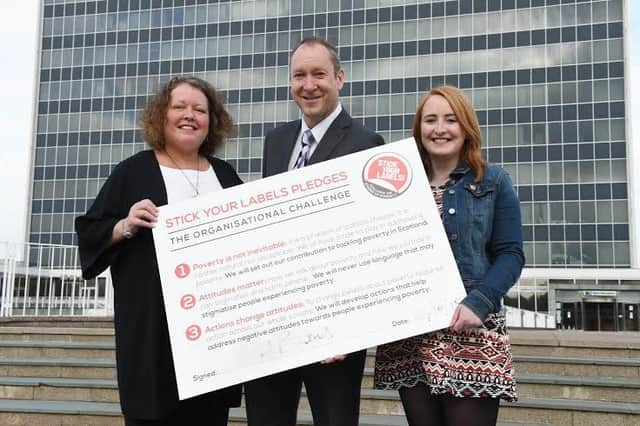Organisations support Challenge Poverty Week


Challenge Poverty Week (CPW), which runs from 17th-23rd October, aims to highlight the experience of people living in poverty and call for greater government action to eradicate it.
More than 900,000 people in Scotland live in low income households, with one in four children currently living in absolute poverty.
Advertisement
Hide AdAdvertisement
Hide AdChild health in Scotland is amongst the poorest in Western Europe with 28 per cent overweight or obese and approximately 400 infants, children and young people dying each year, with a significant number of these deaths potentially avoidable, according to the Royal College of Paediatrics and Child Health Scotland.
The Poverty Truth Commission marked the start of Challenge Poverty Week by gathering in George Square to share experiences of poverty, both in Scotland and around the world, to celebrate individual and collective resilience and make commitments to action.
The Commission brings together some of Scotland’s key decision makers with those living at the sharp end of poverty. Their work ensures that those affected by decisions are central to decision-making, believing that poverty will only truly be addressed when those who experience it first-hand are at the heart of the process.
CPW organisers Poverty Alliance have also hosted events throughout the week discussing various aspects of poverty including stigma, welfare reforms and fuel poverty.
Their report on the impact of welfare reform found that across Scotland 55,864 sanctions were imposed on more than 38,000 people last year and was one of the leading causes of poverty. Many people had their incomes severely cut and in some cases people were left without any money and still expected to comply with benefit entitlement requirements.
“The use of sanctions for even minor infringements of benefit conditions has become increasingly common” it is explained in the report by Welfare Trackers.
The Poverty Alliance are using the week to highlight stigma around poverty through their Stick Your Labels campaign which was re-launched in the Scottish Parliament in May 2015. The campaign seeks to end the use of stigmatising language by developing actions that help address negative attitudes towards people experiencing poverty. The use of judgemental language by some politicians and in the media negatively impacts those in poverty and prevents them from seeking help.
Stick Your Labels is especially relevant in the face of reports that more than a quarter of Scots believe poverty is a result of laziness.
Advertisement
Hide AdAdvertisement
Hide AdThe campaign was initially launched established in 2011 but has been re-launched in the face of further cuts from Westminster.
Members of the Scottish Youth Parliament have been campaigning all year to challenge the causes and stigmas associated with poverty. Friday will see them release a special report on what young people think about poverty, its causes, and the measures being taken to eradicate it.
Chair, Jordan Linden MSYP said: “We wanted to release the report this week, and draw as much attention to Challenge Poverty Week as possible. We have been fortunate to have been able to work really corroboratively with the Poverty Alliance throughout this campaign, and truly believe that tackling an issue as big as poverty has to be done through collaborative voices and involvement.
“My fellow MSYP’s and I will be using this report to urge policy and decision makers to consider the voices of young people, and to take urgent action. Here in Scotland, 1 in 5 children are living in poverty, and this is completely unacceptable. We need swift action and smart solutions from our leaders, and this week is all about voicing those demands.”
Following days of campaigning, Friday will mark the end of this year’s CPW with the release of key reports from both the SYP and Poverty Alliance. The 6th Scottish Assembly for Tackling Poverty, sponsored by the Scottish Government and NHS Health Scotland, will be held in Glasgow which will focus on feeding into the development of the Scottish Government’s Social Justice Action Plan, due to be published in early 2016.